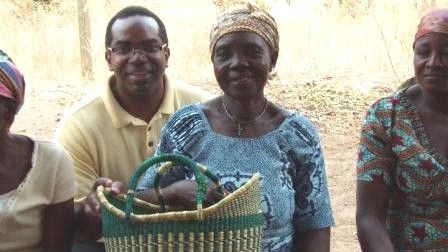Pilgrimage to Ghana: Counting the Cost

This past week, a group of Episcopal Church leaders and lay members have been on a study tour in Ghana, West Africa, to visit Episcopal Relief & Development field partners and programs. Some of their individual responses from the trip will be published on the blog. Today, the Very Rev. Dr. Michael Battle, founder of the PeaceBattle Institute, reflects on the contrast between two experiences on the tour: slavery and development. This post is adapted with permission from his blog.
“For which of you, intending to build a tower, does not first sit down and estimate the cost, to see whether one has enough to complete it? Otherwise, when that person has laid a foundation and is not able to finish, all who see it will begin to ridicule that person, saying, ‘This person began to build and was not able to finish.’” —Luke 14:28-30, NRSV (paraphrased)
As in human slavery, whenever we treat anyone as a means to an end, we fail to count the cost. There are further lessons to learn. We do not count the cost when we allow poverty that prevents children of God from participating fully in God’s created order.
Economic inequity wreaks havoc in which the majority of victims are women and children. The number of those living in poverty is increasing instead of decreasing as called for by the United Nations Millennium Summit. Financing sustainable development must focus sharply on the urgent task of eradicating the conditions that foster poverty. Episcopal Relief & Development’s NetsforLife® malaria prevention program is extremely successful in changing conditions such as malaria fostering poverty.
Jesus puts it this way: “For what will it profit them to gain the whole world and forfeit their life?” (Mark 8:36, NRSV) Even here, Jesus is teaching about counting the costs of profit and lost. Weighing in on counting the cost and changing ancient ridicule to developmental relief is the genius of Episcopal Relief & Development. I have learned this firsthand in my pilgrimage to Ghana. For those with spiritual understanding such as Episcopal Relief & Development, there is a great deal to learn from Jesus’ parable concerning human ridicule. We should never build towers in which we expect someone else to labor while we sit back and relax—or even more tragically, while we enslave. Work as Christians implies at least bilateral movement. We must never allow the unilateral work of slavery. Even in the greatest of labor, Jesus’ dying for our sins, there is the expectation that we too labor. Jesus says, “Whoever does not carry the cross and follow me cannot be my disciple.”
Ultimately, I have learned from my pilgrimage to Ghana that our work as Christians is to make integral what we promise and what actually results. We are to be those who, in Jesus’ eyes, know how to build a tower—and after counting the costs for building it, are willing to labor among God’s people to help all to benefit from the tower’s vantage point. Such a tower now sits at the tallest point in the city of God—whose revenue is beyond counting.
Photo: Father Michael Battle with program participants at the Sherigu Anglican Women Development Center in Bolgatanga, Ghana. Courtesy of Father Michael Battle.


